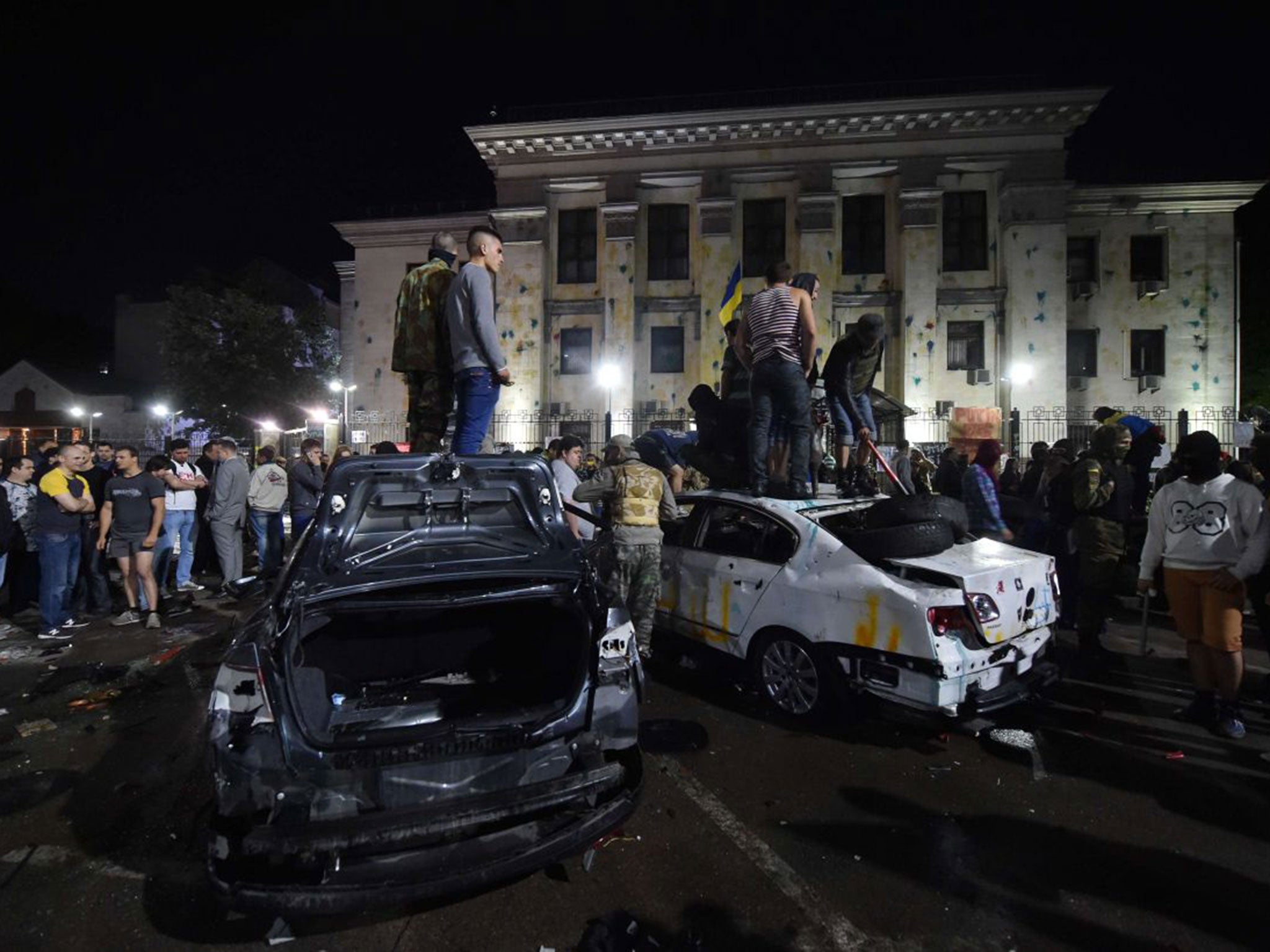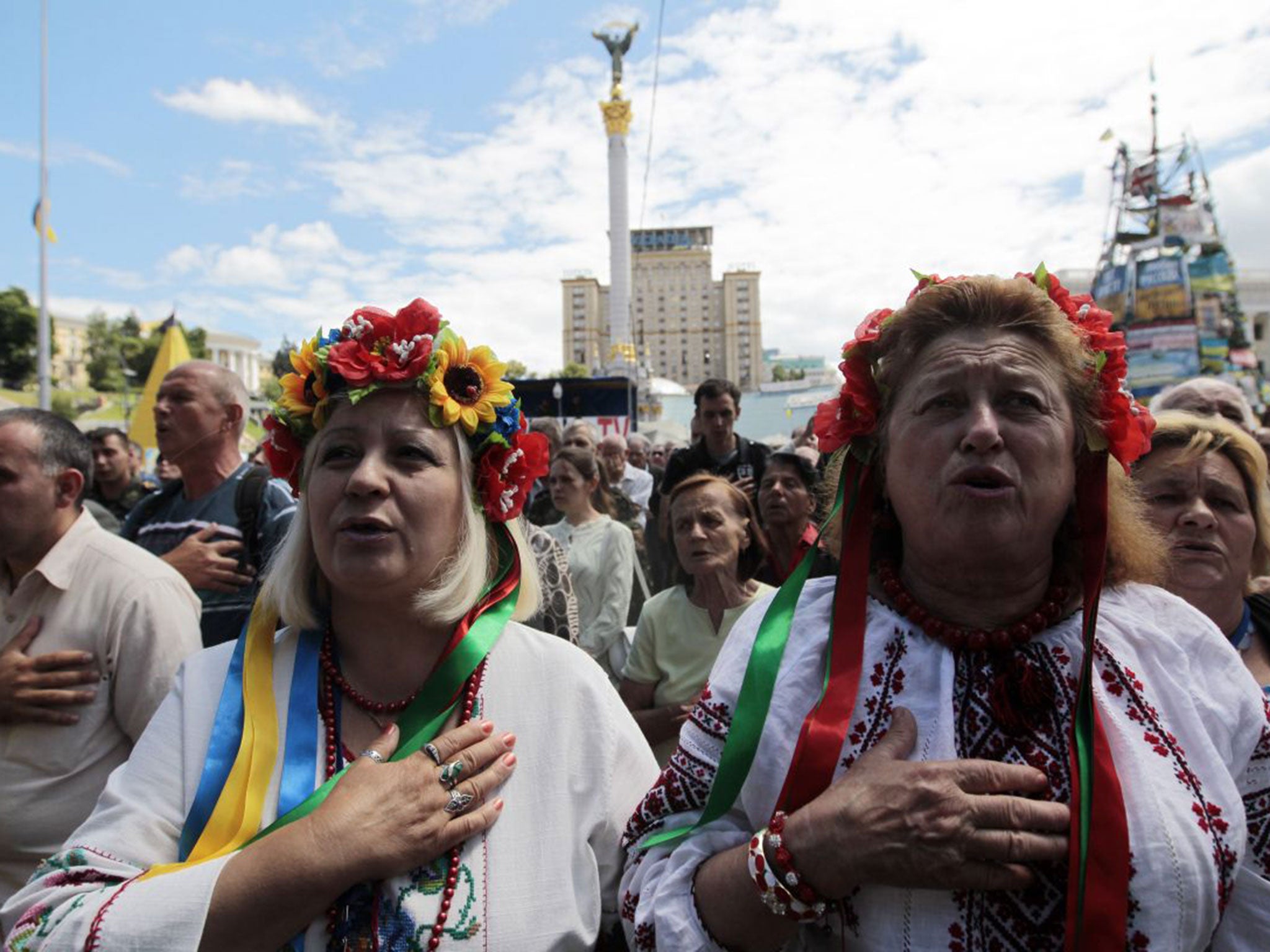Ukraine crisis: Peace prospects in tatters after downing of military plane
Loss of military aircraft at cost of 49 lives threatens to wreck weeks of diplomacy

Your support helps us to tell the story
From reproductive rights to climate change to Big Tech, The Independent is on the ground when the story is developing. Whether it's investigating the financials of Elon Musk's pro-Trump PAC or producing our latest documentary, 'The A Word', which shines a light on the American women fighting for reproductive rights, we know how important it is to parse out the facts from the messaging.
At such a critical moment in US history, we need reporters on the ground. Your donation allows us to keep sending journalists to speak to both sides of the story.
The Independent is trusted by Americans across the entire political spectrum. And unlike many other quality news outlets, we choose not to lock Americans out of our reporting and analysis with paywalls. We believe quality journalism should be available to everyone, paid for by those who can afford it.
Your support makes all the difference.Efforts to broker a truce between Moscow and Kiev have been thrown into jeopardy after pro-Russian rebels shot down a Ukrainian military aircraft, killing all 49 military personnel on board.
The setback comes at a delicate time for the new government in Kiev, with the Russian state energy firm threatening to cut off gas supplies on Monday and Nato alleging that Russian tanks have been spotted in Ukrainian territory.
The separatists shot down the transport plane on Saturday as it came in to land in the eastern city of Luhansk. It was the deadliest incident so far in a conflict which began in February when demonstrators toppled the pro-Kremlin president, prompting the Russian annexation of Crimea and uprisings in cities in the east.
President Petro Poroshenko called for a day of mourning today, and in Kiev people bowed their heads for a minute’s silence while flags flew at half-mast.
But the calls were ignored in many cities in the east, the heart of a separatist uprising which has tipped Ukraine to the brink of civil war. Mr Poroshenko has vowed to retaliate against “all those involved in cynical acts of terrorism of this magnitude” and is to meet his security chiefs today.
The crash threatens to undo a fortnight of intense diplomatic activity after the election in late May of Mr Poroshenko, a billionaire businessman. He has shown a willingness to negotiate with the Kremlin, and US and European leaders engineered a meeting between him and Russia’s President, Vladimir Putin, earlier this month on the sidelines of the D-Day commemorations in France.
But Western leaders returned to threats of sanctions over the weekend, blaming Russia for stoking unrest in Ukraine and failing to stem the flow of fighters and weapons over the border.
Officials in Moscow, meanwhile, reacted angrily to protests at the Russian embassy in Kiev and an outburst against President Putin by the acting Foreign Minister. Ukrainian protesters besieged the Russian embassy after the crash, overturning diplomatic cars and hurling eggs, stones and paint at the embassy building.
It was during these demonstrations that the Foreign Minister, Andrii Deshchytsia, tried to calm tensions, telling the protesters: “We must fulfil our international obligations, including defending the right of Russia to have an embassy in Ukraine.”
When protesters disagreed, he added: “Did I say that I am against you protesting? I am for you protesting. I am ready to be here with you and say ‘Russia, get out of Ukraine’. Yes, Putin is a dickhead. Yes.”
Russia’s Foreign Minister, Sergei Lavrov, called his French counterpart to express “outrage over the inaction of the Kiev authorities who allowed the rioting outside the Russian embassy”. Other allies of President Putin said that such comments threw any peace talks into question.
“I can’t really imagine how anyone, especially a Russian representative, can sit down at the negotiating table with him after such an outburst,” said Leonid Kalashnikov, a senior lawmaker who sits on the Russian parliament’s international affairs committee.
European and US leaders had given Russia until the end of the month to take steps to stem the flow of arms or face further sanctions. Already dozens of Russian and Ukrainian officials are under assets freezes and travel bans, but the West has so far shied away from deeper sanctions targeting whole sectors of the Russian economy for fear of the blow-back on EU nations.
Following the meeting at the D-Day commemorations, Mr Poroshenko and Mr Putin spoke on the phone on Thursday and discussed a peace plan aimed at stemming the separatist violence in the east.
The European Union was set to mediate official talks beginning later this month, but analysts said that the escalation of violence means could hamper such efforts.

“This will refocus attention on the fact that Russia does not seem to be doing very much to moderate the insurgency or the cross-border resupply of separatists,” Timothy Ash, an analyst at Standard Bank, told the Associated Press.
“I would expect the focus to return to sanctions.” Nato also upped the pressure on Russia today, with the Secretary General of the military alliance saying that they were prepared to send aid to Ukraine to help it protect its borders. Earlier Nato published images to back up its claims that Russia may be sending military equipment into eastern Ukraine.
Satellite images taken last week show Russian tanks at a staging area close to the Ukrainian border. Nato also published photographs of similar tanks taken inside Ukraine’s borders. Russia denies it is supplying military equipment to the rebels, but a White House spokesman said they were “deeply concerned” about “the fact that militant and separatist groups have received heavy weapons from Russia, including tanks, which is a significant escalation”.
Moscow and Kiev are also involved in delicate negotiations over gas sales from Russian state energy firm Gazprom which has threatened to cut off supplies to Ukraine unless the authorities start making a dent in the $1.95bn in outstanding bills. Gazprom had set a deadline of today for payment, and Russian and Ukrainian officials were last night trying to reach a compromise over the price.
Join our commenting forum
Join thought-provoking conversations, follow other Independent readers and see their replies
Comments